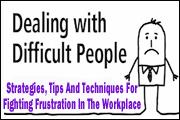Employee Conflict Training
What Is Employee Conflict? Why Does It Occur?
"Employee conflict" refers to disagreements, disputes, or friction between individuals or groups within a workplace. These conflicts can arise due to various reasons such as differences in personalities, work styles, communication styles, values, goals, or competing interests.
Conflicts can range from minor disagreements to more serious disputes that can impact productivity, morale, and overall workplace atmosphere. Conflict in the workplace can manifest in different forms, including interpersonal, goal, cultural, and managerial conflicts.
How Employee Conflict Can Affect An Organization
Employee conflict can have several significant effects on an organization, impacting both its productivity and overall functioning. Here are some ways in which employee conflict can affect an organization:

- Decreased Productivity
- Increased Turnover
- Negative Impact on Morale
- Impact on Innovation and Creativity
- Reputation Damage
- Legal Risks
- Loss of Focus on Organizational Goals
In summary, employee conflict can have far-reaching consequences for an organization. Conversely, it's important to recognize that not all conflict is detrimental. In fact, good employee conflict can bring about several benefits, including increased collaboration, increased trust and respect, enhanced creativity and innovation, and greater innovation, all leading to help with achieving corporate goals.
Benefits From HRTrainingCenter.com's Employee Conflict Training Courses
Training courses for improving employee conflict can offer several valuable insights and skills for both managers and employees. Here are some of the key benefits one might receive from such Employee Conflict training courses:
- A Better Understanding Of Conflict Styles:
Participants can gain insights into different conflict styles and learn how to adapt their approach based on the situation and personalities involved. Understanding one's own conflict style and that of others can facilitate more effective communication and resolution. 
- Conflict Resolution Techniques:
Employees can learn various conflict resolution techniques, such as active listening, assertive communication, problem-solving, and negotiation skills. These techniques empower individuals to address conflicts constructively and find mutually beneficial solutions.
- Conflict Prevention Skills:
Prevention is often better than cure when it comes to conflicts. Employees can learn strategies for identifying potential sources of conflict early on and implementing proactive measures to prevent them from escalating.
- Cultural Sensitivity:
In diverse workplaces, conflicts may arise due to cultural differences. Training courses can educate employees about cultural sensitivity and help them navigate intercultural communication challenges more effectively, reducing misunderstandings and conflicts.
- Team Building:
Building strong teams often involves addressing and resolving conflicts promptly. Training may include team-building exercises and strategies to promote collaboration, trust, and mutual respect among team members, ultimately reducing the likelihood of conflicts arising.
- Cultural Sensitivity and Diversity:
In today's diverse workplaces, it's essential for employees to understand how cultural differences can influence perceptions of conflict and approaches to resolution. Training courses may address issues of cultural sensitivity and inclusion.
- Improved Communication:
Effective communication lies at the heart of conflict resolution. Employees can learn how to express their thoughts and feelings clearly and assertively while also being receptive to others' viewpoints. They may also learn techniques for de-escalating tense situations and promoting constructive dialogue.

- Tips For Building Positive Relationships:
Ultimately, conflict resolution training often aims to foster a workplace culture where employees feel empowered to address conflicts openly and constructively, leading to stronger relationships and higher levels of productivity and morale.
- Successful Problem-Solving Techniques:
Our training courses introduce managers and employees to systematic problem-solving techniques that can help them address conflicts in a structured and collaborative manner.
- Improved Managerial Skills:
Managers may receive additional training on how to handle conflicts within their teams, including techniques for mediating disputes, providing constructive feedback, and fostering a positive work environment conducive to open communication and conflict resolution.
Overall, improving employee conflict training courses can empower individuals and organizations to navigate conflicts more effectively, fostering healthier work environments and stronger relationships among team members.
Best-Selling Training Courses:
Instructor-Led: Virtual/In-Person Seminars
Instructor-Led: Webinars
Find Seminars, Webinars, And Online Training In Your Area


 770-410-1219
770-410-1219








